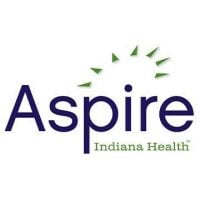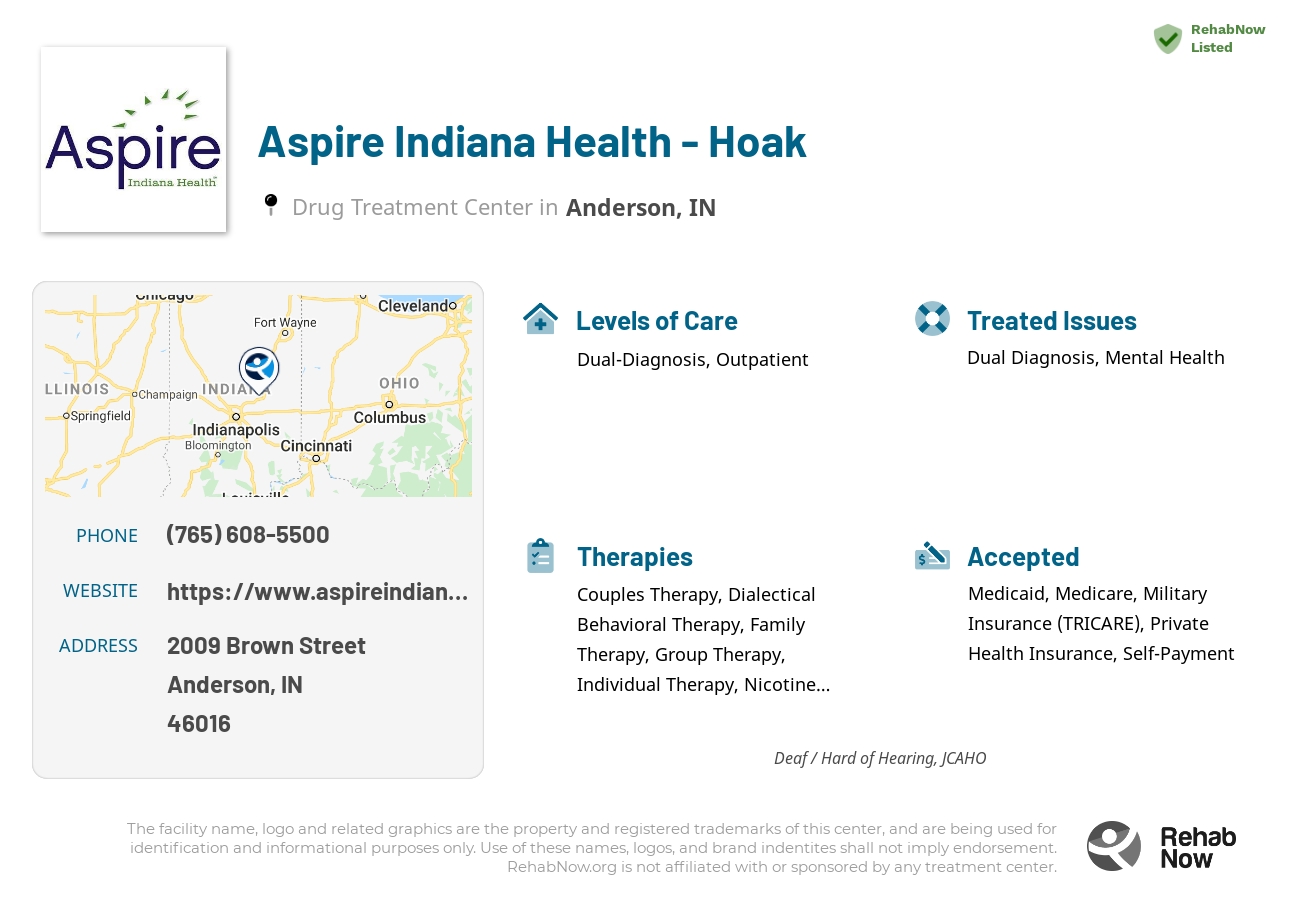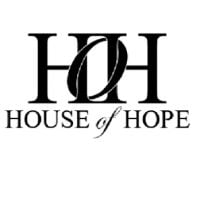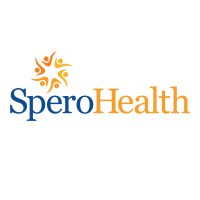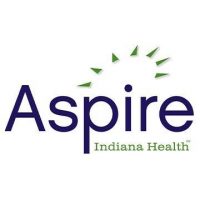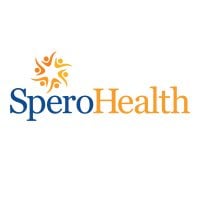Aspire Indiana Health - Hoak
Drug Rehab Center in Anderson, Indiana
Aspire Indiana Health - Hoak in Anderson, Indiana is an Addiction Treatment Facility that offers a comprehensive range of medical and therapeutic programs to help individuals with Dual Diagnosis, Mental Health, Drug Addiction, and Opioid Addiction, utilizing evidence-based and holistic practices.
About Aspire Indiana Health - Hoak in Indiana
Aspire Indiana Health - Hoak, located in Anderson, Indiana, is a renowned treatment facility dedicated to helping individuals overcome substance abuse and mental health challenges. With a compassionate approach and a commitment to personalized care, Aspire Indiana Health - Hoak offers a comprehensive range of services to support recovery and improve quality of life.
- Comprehensive Continuum of Care: Aspire Indiana Health - Hoak provides a seamless continuum of care, offering a range of services from high-intensity treatment to recovery residences and outpatient support.
- Personalized Treatment Plans: Licensed addiction professionals create individualized treatment plans tailored to each client's specific needs, ensuring a targeted and effective approach to recovery.
- Whole Health Recovery Continuum (WHRC): Aspire Indiana Health - Hoak collaborates with Progress House to offer a comprehensive recovery program that addresses all aspects of an individual's well-being, including stable housing and support services.
Aspire Indiana Health - Hoak is accredited by the Joint Commission on Accreditation of Healthcare Organizations (JCAHO), demonstrating their commitment to meeting the highest standards of quality and safety in their services. They specialize in dual diagnosis, mental health, drug addiction, and opioid addiction treatment, providing a holistic approach to recovery.
Aspire Indiana Health - Hoak treats a wide range of addictions and mental health issues, including substance abuse disorders, dual diagnosis, and opioid addiction. They offer various levels of care, including outpatient programs and detoxification services, ensuring individuals receive the appropriate level of support based on their unique needs.
Genders
Ages
Modality
Additional
Accreditations

JCAHO
Conditions and Issues Treated
A “dual diagnosis” is when the individual has two medical issues at the same time. The top co-occurring mental disorders with addiction are depression, anxiety, ADHD, bi-polar disorder. Addiction is also considered a mental illness that is not a choice but rather a medical condition. Addiction can be caused by any number of underlying issues.
Dual diagnosis is provided by Aspire Indiana Health - Hoak to treat addictive tendencies as well as any untreated mental illnesses. This ensures successful long term health and recovery for patients after treatment has been completed.
Dual diagnosis is provided by Aspire Indiana Health - Hoak to treat addictive tendencies as well as any untreated mental illnesses for people in Indiana. This ensures successful long term health and recovery for patients after treatment has been completed.Levels of Care Offered
This center offers a variety of custom treatment tailored to individual recovery. Currently available are Dual-Diagnosis, Outpatient, with additional therapies available as listed below.
Outpatient programs at Aspire Indiana Health - Hoak, the Anderson resident can live with their family while continuing with their job or studies. Treatment includes educating the patient on drug abuse, medications, and counseling sessions at the individual or group level. Outpatient treatment plans cover diagnosis, detoxification, management, and counseling. They are a popular option for those who have graduated from inpatient facilities.
Therapies & Programs
Individual therapy is a form of counseling where you meet with a trained professional one-on-one. Meeting with a therapist in this setting allows for a personal and trusting relationship to be built. This allows the patient to open up about sensitive or private issues they may not feel comfortable discussing in a group. Individual therapy helps identify the root causes of your addiction, which can help prevent relapse.
Couples therapy for drug addiction is a unique form of therapy that allows family members to work through the emotional issues of their loved one’s addiction together. Family members can support each other while learning how to cope with the addiction and encourage healthy changes. The two will work with a therapist to learn how the addiction affects themselves and the relationship.
Family therapy is often done alongside drug treatment to help addicts stay sober. The goal of family therapy for drug addiction is to create an environment where communication can happen without judgment, hostility, or blame. The therapist will sit with the family so they can learn how to communicate differently and provide new tools for dealing with emotions so that people don’t want to drink or do drugs. It’s important for families to focus on relapse prevention plans during treatment so that if the addict feels like they want to use again, they’ll know what steps they need to take together to prevent it from happening again in the future.
Group therapy sessions are another common addiction recovery service. These group sessions typically involve six to 12 addicts who meet regularly with a trained professional for support and guidance.
During these sessions, the group shares their experiences with one another and provides feedback that can help each member avoid relapse or overcome specific obstacles they are facing in their recovery process. With this type of support and guidance, addicts can feel like they are part of a community that understands their struggles and will help them get through the hard times.
Many people struggling with drug addiction have experienced some form of trauma in their lives. It is crucial that these individuals seek out professional help; otherwise, their drug abuse and addiction will likely continue.
Therapists and counselors at drug treatment centers employ several treatment programs to help people struggling with drug addiction, including trauma therapy. Trauma therapy helps people dealing with addiction by allowing them to confront the traumas of their past and move past them.
It is important to note that trauma therapy should not be confused with PTSD (post-traumatic stress disorder). Rather, it is used to treat the effects of trauma, which are often at the root of addiction.
Dialectical Behavior Therapy was developed in the 1980s to treat chronically suicidal individuals. It is a cognitive-behavioral therapy that combines standard DBT with strategies derived from Zen Buddhism, such as mindfulness training.
DBT has been adapted for use with other types of psychiatric problems, including eating disorders, substance abuse disorders, borderline personality disorder, posttraumatic stress disorder (PTSD), and other personality disorders. Dialectical Behavior Therapy is considered a psychosocial treatment of BPD. This means that while it can be used alone or in conjunction with drug treatments, DBT does not rely on medications to treat the disorder. Instead, DBT aims to help patients change their thinking and behavior.
Cognitive Behavioral Therapy (CBT) focuses on the underlying thoughts and behaviors that caused the problem of addiction in the first place and may cause a relapse. Negative feelings are common in drug abuse disorders, but they can lead to co-occurring disorders if not recognized. CBT involves strategies that help to change the behavior pattern by restructuring negative thoughts into positive ones. It helps to remove these feelings, and it provides long-term benefits. Also, CBT promotes self-awareness and self-control. It can be administered as a monotherapy or as part of combination therapy.
CBT can improve the patient’s mood, reduce drug cravings and boost success rates on treatment plans. Regular practice can help individuals handle negative attitudes, thoughts, and feelings without turning to drugs or alcohol. The core belief of Cognitive Behavioral Therapy (CBT) is that one’s moods, behaviors, and actions are all connected. Individuals can improve their quality of life using CBT. It helps addicts understand the patterns of thought and feelings that cause them to use drugs or alcohol and develop a healthy response.
Payment Options Accepted
For specific insurance or payment methods please contact us.
Is your insurance accepted?
Ask an expert, call (888) 674-0062
Aspire Indiana Health Associated Centers
Discover treatment facilities under the same provider.
- Aspire Indiana Health - Mockingbird Hill Recovery Center in Anderson, IN
- Aspire Indiana Health - Lebanon Health Center in Lebanon, IN
- Aspire Indiana Health - Noblesville in Noblesville, IN
- Aspire Indiana Health - Dehaven Health Center in Anderson, IN
- Aspire Indiana Health - Elwood Health Center in Elwood, IN
Learn More About Aspire Indiana Health Centers
Additional Details
Specifics, location, and helpful extra information.
Anderson, Indiana 46016 Phone Number(765) 608-5500 Meta DetailsUpdated April 15, 2024
Staff Verified
Aspire Indiana Health - Hoak Patient Reviews
There are no reviews yet. Be the first one to write one.
Anderson, Indiana Addiction Information
The state of Indiana ranks 14th in the nation for drug abuse, but 17th for drug overdoses. The state has many high-quality rehabilitation centers, but reports show that there are about 20 deaths per 100,000 people. This is due to its location making it a drug trafficking haven, where many drugs are further distributed into the country.
Almost five percent of the population in Anderson, IN is struggling with substance abuse problems. The most commonly misused substances in Anderson include alcohol, marijuana, methamphetamine, heroin, prescription drugs, cocaine, and club drugs. In 2017, about 10 people died from opioid overdoses in Anderson. In 2018, 55% of those arrested for drug violations were younger than thirty years old. Common drug treatment options include inpatient rehabilitation and 12-step programs.
Treatment in Nearby Cities
- Michigan City, IN ( mi.)
- Knox, IN (96.6 mi.)
- Edinburgh, IN (53.5 mi.)
- Plainfield, IN (46.7 mi.)
- Seymour, IN (79.4 mi.)
Centers near Aspire Indiana Health - Hoak
The facility name, logo and brand are the property and registered trademarks of Aspire Indiana Health - Hoak, and are being used for identification and informational purposes only. Use of these names, logos and brands shall not imply endorsement. RehabNow.org is not affiliated with or sponsored by Aspire Indiana Health - Hoak.
